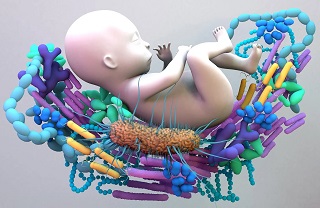BREAKING NEWS! COVID-19 Infection In Pregnant Women Alters Microbiota Composition Passed Onto Infants, Impacting Their Long-Term Health!
Medical News - COVID-19 Infection - Pregnant Women - Alters Microbiota – Infants - Long-Term Health Jul 02, 2023 1 year, 9 months, 3 weeks, 3 days, 23 hours, 13 minutes ago
University of Massachusetts Study Reveals Lasting Effects of SARS-CoV-2 On Maternal Microbiome and Offspring
Medical News: In an alarming discovery, researchers at the University of Massachusetts Chan Medical School-USA have found that pregnant women infected with COVID-19 experience significant changes in their microbiota, which are then passed on to their infants. These alterations in the microbiome have potential implications for the long-term health of the offspring, affecting their immune system development and overall well-being.

The initial colonization of a newborn's microbiome is crucial for the establishment of a robust immune system, which plays a vital role in long-term health outcomes. The study conducted by the research team examined the gut, vaginal, and oral microbial diversity of pregnant women with SARS-CoV-2 infection and compared it to healthy control subjects. The findings revealed reduced microbial diversity in infected pregnant women, with early infections showing a different vaginal microbiota composition at the time of delivery compared to healthy counterparts.
The study also identified two specific Streptococcus sequence variants (SV) with low relative abundance, which were predictive of infants born to pregnant women with SARS-CoV-2 infection. These results suggest that COVID-19 infections during pregnancy, especially in the early stages, can lead to lasting changes in the maternal microbiome, compromising the initial microbial seed of the infant.
The impact of the SARS-CoV-2 virus on the microbiota of pregnant women and their offspring has been a subject of growing interest. Previous studies have demonstrated dysbiosis in the microbiomes of COVID-19 patients with severe symptoms. Pregnant women with SARS-CoV-2 infection face a higher risk of experiencing severe symptoms, which can result in various complications and adverse outcomes.
While previous research has characterized the microbiotas of pregnant women with SARS-CoV-2 infection, the focus has primarily been on the gut microbiota. This study delved deeper, exploring the impact of the infection on the vaginal and oral microbiotas of pregnant women and their subsequent effects on the offspring's gut and oral microbiota.
The researchers observed perturbations in the vaginal, gut, and oral microbiota of infected pregnant women compared to healthy controls. Importantly, these microbiome alterations in pregnant women were reflected in the oral microbiome of the infants. This observation suggests that SARS-CoV-2 infection plays a significant role in shaping the abundance of bacteria associated with immune regulation and pregnancy outcomes.
Furthermore, the study found that infants born to mothers with active SARS-CoV-2 infection had higher levels of fecal calprotectin, indicating early gut inflammation. These infants also exhibited a pro-inflammatory immune tone early in life, as indicated by the induction of T-cell-associated cytokines.
Corresponding author, Dr Ana Maldonado-Contreras from the Department of Microbiology and Physiological Systems, Program of Microbiome Dynamics, University of Massachusetts Chan Medical School, told Thailand
https://www.thailandmedical.news/">Medical News, “
Past study findings show that as a result of the altered microbiota that are passed to the infants born to pregnant women with SARS-CoV-2 active infection, these babies have higher levels of fecal calprotectin, indicative of an early gut inflammation. Similarly, infants born to mothers with active SARS-CoV-2 infection exhibit induction of T-cell-associated cytokines (IL33, NFATC3, and CCL21) compared to infants born to healthy mothers. Therefore, infants born to mothers with active SARS-CoV-2 infections may present a pro-inflammatory immune tone early in life!”
The study provides critical insights into the microbial changes associated with SARS-CoV-2 infection in pregnant women and highlights the need to understand the potential clinical implications beyond immediate infection risks.
Understanding these changes can help researchers explore potential treatments and interventions to counteract the adverse effects on the infant's microbiota.
The researchers emphasize the importance of actions such as probiotic intake and a diet focused on microbiota balance for infected patients, in addition to avoiding SARS-CoV-2 infections. Parental intervention becomes crucial, as parents are the primary source of microbiota colonization for infants. As COVID-19 continues to be a prevalent concern, especially with the widespread recommendation of COVID-19 vaccination during pregnancy, it is essential to address all potential risks associated with SARS-CoV-2 infection, including the impact on the gut microbiota and the development of preventive therapies. Further research is needed to fully understand the mechanisms by which COVID-19 infection alters the maternal microbiome and its long-term consequences on the offspring. Additionally, studies focusing on larger cohorts and different geographic regions would help validate and expand upon the findings of this study.
The study findings were published in the peer reviewed journal: Microbiome (BMC- Springer)
https://microbiomejournal.biomedcentral.com/articles/10.1186/s40168-023-01577-z
For the latest
Medical News, keep on logging to Thailand Medical News.
